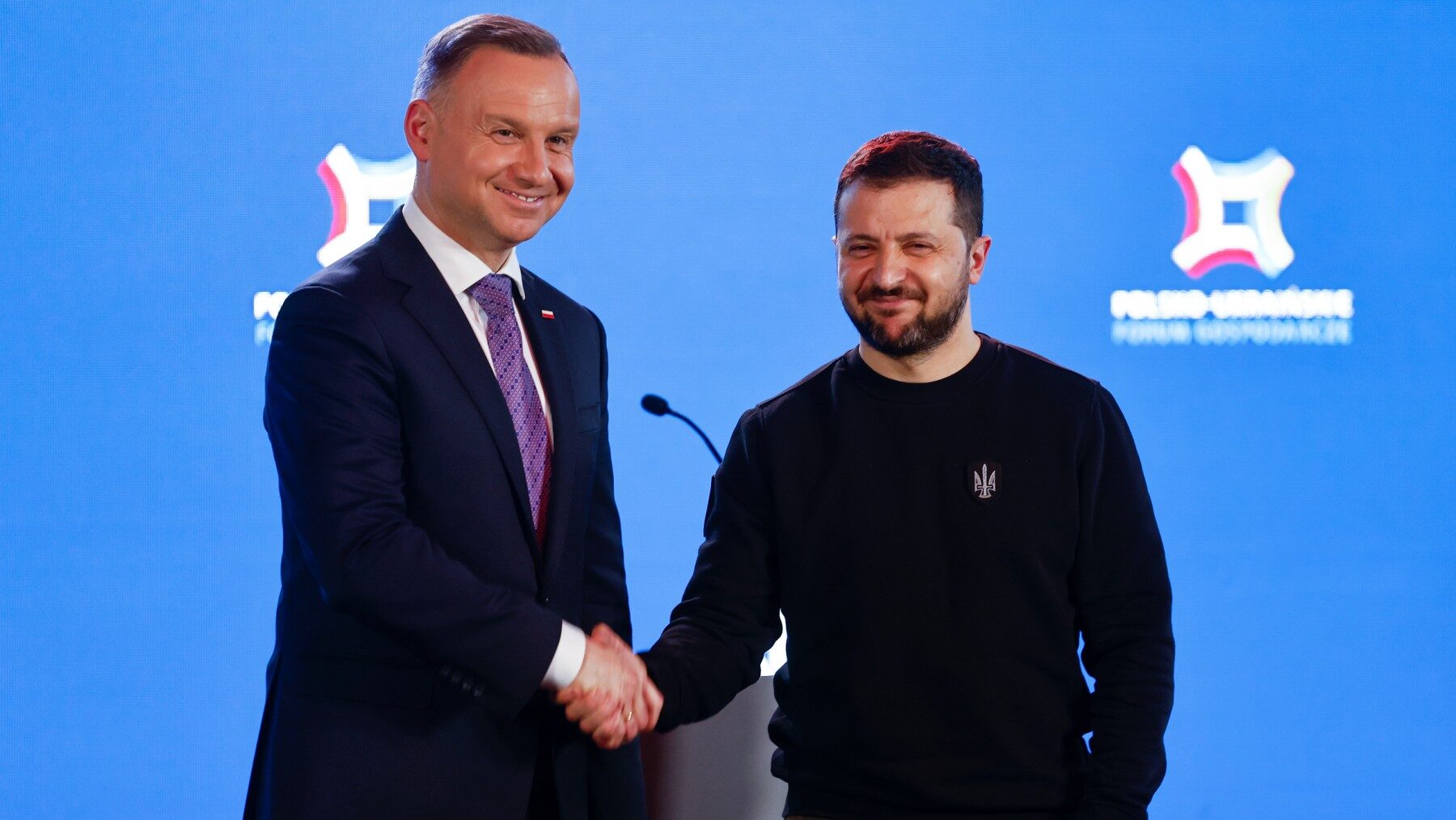
Happier times: Polish President Andrzej Duda (L) and Ukrainian President Volodymyr Zelensky shake hands after addressing a Polish-Ukrainian economic forum in Warsaw, Poland, on April 5, 2023. A planned meeting between the two heads of state at the United Nations Tuesday did not take place, with their two countries citing different reasons.
Photo: Wojtek Radwanski / AFP
The question of Ukrainian grain imports to Europe and Ukraine’s lawsuit against Poland, Slovakia, and Hungary is a continuing ripple of feigned shock and mutual recriminations against the backdrop of the media, the common market, elections in Poland and Slovakia, and the war in Ukraine.
“I was surprised. Certainly, the lawsuit, if they (the Ukrainians) file it, has no legal basis because taking food in an uncontrolled way to an EU member state is probably not an argument,” Slovakia’s Agriculture Minister Jozef Bíreš said on Tuesday, September 19th, in statements given to the press in his home country.
Ukraine has offered mechanisms to monitor the amount of grain entering the EU, and Bíreš added that time is limited to negotiate the so-called grain export licensing proposed by Ukraine.
He also announced that Slovakia will expand the EU’s current €5 million in aid to Slovakia’s farmers to €15.7 million.
Poland, Hungary, and Slovakia have banned sales of a list of Ukrainian agricultural products in their country, a unilateral move against the EU commission’s ‘solidarity lanes’ established last year that temporarily removed trade barriers for the agricultural heavyweight and EU member candidate. The ‘solidarity lanes’ are designed to provide a land route for Ukrainian products to reach global markets, as Russia has blockaded the Black Sea. But wheat markets in countries bordering Ukraine were flooded with Ukrainian products and farmers baulked.
The EU Commission justified ending the ban on sales of Ukrainian grain in Poland, Hungary, and Slovakia on the basis of markets no longer being flooded, and said that it would take action again, should the situation repeat itself.
Poland justifies its decision by reminding Kyiv and Brussels that it is still willing to allow Ukrainian products to transit through the country. Slovakia also argues that, if Poland and Hungary maintain their bans, it has no choice but to do the same, as it would become the sole funnel for Ukrainian products.
The wheat conflict has strained otherwise good relations between Slovakia and Poland and Ukraine. Both of the EU countries are also in campaign mode for upcoming elections, in which relations with Ukraine are a prominent issue. In Poland, farmers are the demographic to court, as well.
Polish Minister of European Affairs Szymon Szynkowski told the state-run news agency PAP on Wednesday,
We would like to continue supporting Ukraine, but for this to be possible, we must have the support of Polish citizens.
Szynkowski warned that support to Kyiv may be scaled back in light of the lawsuit filed by Ukraine. Poland has served as a major transit point for weapons and aid to Ukraine and has taken in over 15.4 million refugees since the beginning of the war.
According to unofficial sources cited by PAP, Poland’s foreign ministry on Wednesday, September 20th, called for a meeting with the Ukrainian ambassador following remarks made by President Zelensky in a speech at the United Nations the previous day. In his speech, Zelensky referred to the discord over grain exports as “political theater” that he said was only helping Moscow.
Polish President Andrzej Duda was supposed to meet with President Zelensky at the UN Tuesday, a meeting that ended up not taking place. While expressing regret over the rift with Ukraine, Duda said in an interview with Bloomberg Television,
We cannot allow that Ukrainian grain is sold on the Polish market without any control … We also have our own citizens, we have to care for their interest.”
As the ban by the three countries technically violates common market rules, and some EU countries import Ukrainian wheat, it is also reverberating in Brussels.
European sources in Brussels have expressed equal frustration with Poland’s staunch maintenance of the trade barrier on Ukrainian grain, Politico reports.
“When it suits you, you are in solidarity and when it doesn’t suit you, you are not,” German Agriculture Minister Cem Özdemir said Monday just before a meeting of EU farm ministers.
